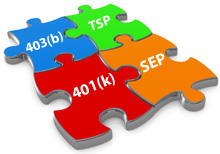 |
||
|
Stifel Client Account Access: LOG IN ● 1 Consolidate 2 Manage 3 Retire Well ● Contact Us |
||
|
|
||
| ROLLOVER CENTER |
IRA DISTRIBUTIONS FOR CHARITABLE DONATIONS
The Pension Protection Act of 2006 allowed certain IRA holders the
opportunity to donate assets in their IRA to qualified charitable
organizations. If it’s done
correctly, the distributions are tax-free.
The provision applies for Traditional and Roth IRAs and does not
typically apply to distributions from active SEP or SIMPLE IRAs unless an
employer contribution was not made to the SEP or SIMPLE IRA during or for
the year the charitable distributions are made.
Originally, this benefit was available only through December 31, 2007.
On October 3, 2008, President Bush signed into law The Emergency
Economic Stabilization Act of 2008, which contains a provision that
extends the charitable donation
benefit through December 31, 2009.
Eligibility and donation limit
IRA holders must be at least 70˝ years of age on or before the actual day
of making the donation.
For those who do qualify by age, their maximum IRA charitable donation is
limited to $100,000 per tax year. Any
distributions in excess of this limit will not qualify for the tax
exclusion benefit and will be treated as ordinary income.
Note that distributions of base contributions and tax-paid
conversions to Roth IRA holders are generally not considered taxable
income.
Direct payment requirement
The IRA holder must instruct the IRA trustee/custodian to issue the
distribution check payable to the charity (including the charity’s
address). The check can be
mailed either to the IRA holder or directly to the charity.
If the check is mailed to the IRA holder, he or she is ultimately
responsible for delivery of the check to the charity.
The IRA holder is also responsible for receiving a receipt from the
charity for proof of a direct donation.
If an individual elects to receive an IRA distribution directly (payable
to the individual) with the intention of making a future charitable
donation, the IRA holder must report the distribution as ordinary income
received. To offset, the IRA
holder would deduct the charitable contribution on their income tax return
through itemized deductions, if eligible. (Contact a professional tax
advisor for eligibility information.)
Charitable donation satisfies Traditional IRA Required Minimum
Distributions (RMDs)
Amounts of up to $100,000 sent directly to a qualified charity on behalf
of an eligible Traditional IRA holder will count toward satisfying that
individual’s Required Minimum Distribution (RMD) for the year.
Note, however, that if an individual turns 70˝ in 2008 and elects
to delay their first RMD until April 1, 2009, that distribution will be
reported in 2009. In order to
utilize the benefit for 2008, the donation must be distributed from the
IRA by December 31, 2008.
Benefit of excluding income
By not including a charitable donation from an IRA as ordinary income, an
individual’s adjusted gross income is not increased, which could affect
the ability to qualify for Roth contributions or conversions.
Qualified charities
For information pertaining to qualified charities, go to the IRS web site,
www.irs.gov/individuals, and review the “Charities and Non-Profits”
section.
Please note that this information is for educational purposes only and it
is always recommended that you seek the aid of a competent tax advisor or
tax attorney to assist you with tax advice and guidance.
To better understand your options when taking a distribution for the purpose of making a charitable donation please take a minute to order a Rollover Kit. _ __________________________________________ |
Your Life. Your Money. Take Control Today! |
| Rollover Center Home | ||
| 401k ROLLOVERS | ||
| Order Rollover Kit | ||
| What is a 401k Rollover? | ||
| How Do I Start a Rollover? | ||
| ROLLOVER IRA s | ||
| Traditional IRA | ||
| Roth IRA | ||
| Which IRA is Best? | ||
| Investment Options | ||
| Contribution Limits | ||
| PLANNING | ||
| Retirement Planning | ||
| Estate Planning | ||
| Wealth Tracker | ||
| Wealth Strategist | ||
| RESOURCES | ||
| Search FAQs | ||
|
About Us |
||
|
|
||
 |

